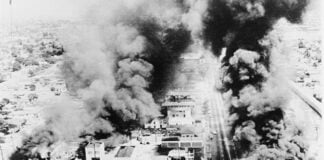Review: The Howard years
ABC1, November 17 to December 8
We survived the Howard years, and now you want us to watch it on Monday night prime time! That’s the sentiment of lots of people who are not tuning in to see Howard and Downer, Abbott and Costello, and Peter (still-a-liar) Reith justify themselves in our lounge rooms.
The ABC’s veteran queen of bland radio journalism, Fran Kelly, has spent months interviewing the Liberal-National heavies of 1996-2007. While promoting the TV series as “no spin” what we get is self-justification, ego and sympathy seeking from politicians and mates.
But where is the opposition?
In The Howard Years Labor is invisible. It’s as if the producers decided they were irrelevant to the story. Yet it was Labor’s failure to effectively oppose the government that allowed Howard to appear relatively decisive and competent.
Yes, the Coalition won four elections, but surveys showed a majority opposed government policies like the GST, the sale of Telstra, increased funding to private schools, higher HECS payments, and the war in Iraq; and were in favour of a republic, reconciliation, union rights and signing the Kyoto Protocol.
It was a time that saw some of the largest demonstrations in history—thousands picketed to defend the Maritime Union in 1998, 10,000 shut down the World Economic Forum in Melbourne in 2000, and a million protested the invasion of Iraq in 2003.
However Labor’s loser-leaders—Beazley, Crean, Latham, then Beazley a second time—accepted Howard’s neo-liberal starting point: privatisation and the “discipline” of the market, tax cuts for the rich, and acceptance of the US alliance.
In 1998, in the “GST election”, Beazley’s credibility suffered because Howard relentlessly told voters he was on record back in 1985 as wanting a GST. In 2001, in the “Tampa election”, Beazley tried to out-compete Howard being ‘tough on border security’.
Then in 2004—despite the enormous protests against the Iraq War—Latham went out of his way to show his commitment to the American alliance. His very modest reform agenda gave room for Howard to narrow down debate in the final days to the accusation that mortgage interest rates would go up under Labor.
Certainly the series reminds us how Howard lied. In 1996 he was cunning enough to keep his anti-worker policies secret behind slogans such as “for all of us”. This was enough to wipe out the discredited right-wing Labor government of Paul Keating.
And in 2001, the pictures “proving” asylum seekers threw their children overboard to “queue jump” came straight out of slimy Peter Reith’s office.
But people didn’t vote for Howard simply because they were deceived. Commentator Alan Ramsay was about right when he said in August 2003 that many voters thought of Howard as a “nasty little twerp, but a little twerp who knows what he’s doing”.
Howard’s comparative credibility had plenty to do with being around while the world economy grew steadily, so job insecurity fell and incomes rose for many people, despite (and often because of) longer working hours. And he had the support of the ruling class media.
His main political strategy was to expose Labor’s lack of an alternative.
Howard used nationalism to obscure class differences, especially around border security and a once-proud-nation history narrative, intensified by troops sent to Timor, Afghanistan, the Solomons and Iraq.
He explained this to the NSW Liberal Party after the 2004 election: “… one of the greatest errors that my opponent made over the last year was to reintroduce into Australian politics the notion of class. We perform as a party that represents all of the Australian community. We are a party that believes in the capitalist system…”
As we said in March 2006, “Howard has understood that maintaining power requires convincing the majority that his policies are not based on privilege and inequality. Howard has fought the idea that class exists in Australia, while doing everything he can to increase inequality.”
Yet people were not conned. The struggle against WorkChoices—a return of more open class politics, with large street marches—underpinned Rudd’s victory a year ago.
The truth is, if Labor and its union official allies had taken the fight up to Howard after his first win in 1996—instead of accepting he had a mandate and people had become more right-wing—The Howard Years could have been a one-part comedy of errors instead of this four-part romanticised Liberal family drama.
By Bruce Knobloch





